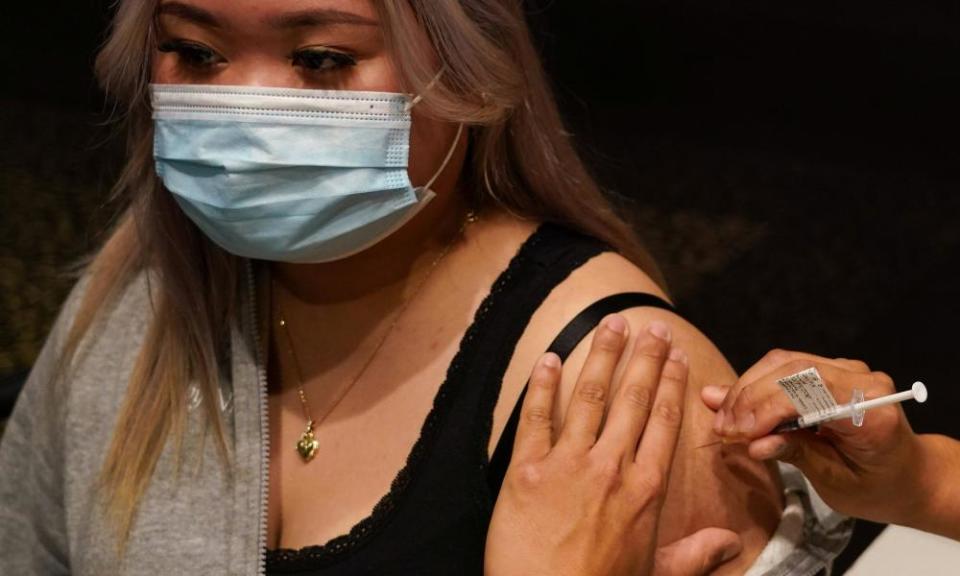Head of Australia’s Covid vaccine strategy not ruling out cash incentives to achieve 80% target

The head of the country’s Covid vaccination program, Lt Gen John Frewen, says the government may yet use cash incentives to encourage take-up, as he says it is “mathematically” possible for 80% of eligible Australians to be fully immunised by December.
New targets released by Frewen’s taskforce on Tuesday forecast a rapid ramp-up of the vaccination program over the coming months, with Operation Covid Shield planning to use drive-through vaccination clinics, retail hubs and workplace vaccination programs to drive up the national vaccination rate from its current 20% level.
Frewen said that he believed the government had sufficient supplies and distribution channels coming on stream to meet the 80% double dose target, but it would depend on public willingness to get vaccinated.
“It really is about people in Australia coming forward and coming forward with some urgency to get vaccinated,” he said.
“We will have everything in place to be able to get to those sorts of numbers by the end of the year, but public willingness to come forward is key and all of us need to keep encouraging everybody to get that vaccination booked and get out and get vaccinated.”
Frewen was asked about Labor’s proposed $300 cash for jabs plan, and said incentives were being considered, “but right now Australians are coming forward.”
“Demand is still exceeding supply right now, so the time for incentives I think may be later in the year when we’re getting into some of the more hesitant sort of groups,” he said.
“We will look at all of the sorts of positive alternatives. There is cash, there is the ideas of lotteries, all these things are being discussed.”
“But what is resonating with people right now really is being able to get back to the sort of lifestyle we used to enjoy, international travel, not having to do quarantine, not having to go into lockdowns and those sorts of things.”
“Getting vaccinated is the right thing to do, it’s the right thing for individuals and it is the right thing for our nation.”
Frewen also said a new advertising campaign would be launched to coincide with increased supplies of vaccine coming on stream, with targeted messages to hesitant groups.
He also said he was confident that these supplies would be able to be distributed through the states and new distribution channels, based on each of their needs and “particular styles”.
He said decisions about who would get vaccine supplies – for example, whether companies would be allocated batches within current jurisdictional quotas or separately to the state amounts – was still to be negotiated.
“When it comes to the distribution, I will make recommendations about where major new arrivals of vaccines might go, but ultimately this is a matter for government, and they will ultimately decide,” he said.
Frewen’s suggestion that incentives may be needed came as the prime minister, Scott Morrison, and the opposition leader, Anthony Albanese, clashed in parliament on Wednesday over Labor’s incentive plan which would give people $300 to get a vaccine.
Morrison said the plan was an insult to Australians and suggested Labor would be spending $2.4bn of the $6bn to backpay people who had already chosen to get vaccinated.
“The advice that has come forward from whether it is the chief medical officer or Gen Frewen is that cash payment for jabs, a cash splash for jabs, Mr Speaker, is not their advice,” Morrison said in question time.
“It is not the advice that is being given to us, that we should be spending $6bn – splashing cash … to those who have already received the vaccine.”
Related: Covid death of Sydney man Aude Alaskar, 27, prompts calls for young people to get vaccinated
When asked if Morrison was out of step with the earlier remarks of Frewen, the prime minister said: “There is certainly no suggestion of the types of incentives that he refers to.”
Labor leader Anthony Albanese said the proposal was about “using every tool at our disposal” to encourage take-up.
“Economic incentives work in a whole range of areas,” Albanese said.
“We need people to get vaccinated and most Australians, I certainly hope will go and get vaccinated. Because the big incentive is, of course, to not die and to look after your family and to look after your community, it’s the right thing to do.
“But it will start a conversation with so many people who are like, ‘I might do it, I’ll do it down the track’. I want conversations to start. And we need to use every tool at our disposal.”
The debate over Australia’s vaccination rate comes after the government released Doherty Institute modelling that showed that until vaccination rates reach 70% any outbreaks would probably see “rapid and uncontrolled” growth, and a significant number of deaths and severe cases.
The government is debating how it will manage the lifting of restrictions once vaccination levels are high enough, including through quarantine free travel and the use of a digital vaccination certificate to engage in community activities without restrictions.
But the use of digital vaccination certificates has prompted internal resistance within the Coalition, with some conservatives arguing their use is a breach of individual liberties.
The Tasmanian Liberal senator, Eric Abetz, said on Wednesday that such planned use of vaccine information “potentially threatens the freedom of Australia’s citizens and will create second-class citizens based on their health status”.
“The proposed restrictions on freedoms leaves questions from precedent to freedom to privacy and the situation for those who cannot be vaccinated for medical reasons,” Abetz said.
Figures released on Wednesday showed a new record day for vaccinations, with 213,000 jabs administered, bringing the total number of vaccines administered to 12,808,398.
This brings the vaccination rate for those over the age of 16 to 41.92% for a first dose, and 20.24% for both doses.

 Yahoo Finance
Yahoo Finance 